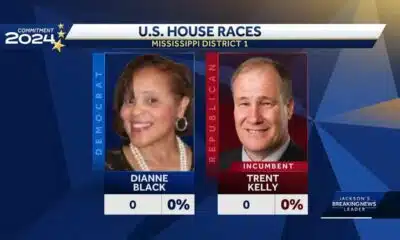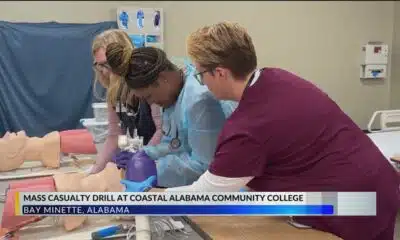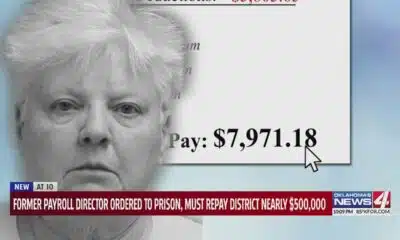Mississippi News
Mississippi lawmakers attempt to save money on prisoner health care with Medicaid
Mississippi legislators want to save money on prisoners’ health care. Reluctance to expand parole makes that tricky.
Reluctance to expand parole may have led Mississippi legislators to unwittingly sabotage an effort to save state money by shifting some incarcerated people’s health care costs to Medicaid.
The state’s prisons are overcrowded, and hundreds of prisoners are sick and elderly– the consequence of harsh mandatory sentencing laws that have led to large numbers of people growing old in prison for the first time in American history.
Though many of them are eligible for Medicaid coverage because of age or disability, the program won’t pay for health care provided inside institutions like jails and prisons, leaving Mississippi on the hook for expensive health care.
The state spent about $77 million on health care for people in prison custody in 2020, including $24 million on offsite care at hospitals. Just over 500 prisoners are older than 65, and research shows the cost of incarcerating an elderly person is about three times higher than a younger person because they have much more expensive health care needs.
House Bill 936 was approved by both chambers this week and is on its way to the governor for his signature. It aims to address prison health care costs by creating “special care facilities” that could serve as a home for some of the 600 Mississippians who have been paroled but have nowhere to go and so remain in Department of Corrections custody. The bill would also expand medical parole for “medically frail” incarcerated people to the private facilities, where supporters say Medicaid would help pay for care.
The legislation could put Mississippi at the vanguard of states experimenting with placing elderly, sick incarcerated people in nursing homes.
But there’s a wrinkle: Federal guidance issued in 2016 says Medicaid won’t pay for nursing care if residents’ freedom of movement is restricted or if the criminal justice system retains a role in their health care. Some provisions of HB 936 appear to run afoul of those rules, raising the possibility that Medicaid would refuse to pay for at least some parolees’ care at the facilities, forcing the state to keep paying.
The bill defines “medically frail” as people who are so ill that they can’t perform daily living activities and are not expected to recover. Those parolees must agree to have their medical records sent to a county prosecutor every quarter if the prosecutor requests them.
And in a provision that was added after the bill passed the House and included in the final conference report, the State Parole Board will revoke parole if the person recovers, “and the department shall ensure that the inmate returns to incarceration.”
Gov. Tate Reeves’ office did not respond to a request for comment on the legislation.
Dan Mistak, acting president and director of Health Care Initiatives for Justice-Involved Populations at the non-profit Community Oriented Correctional Health Services, said sending someone back to prison if their health improves seems to cross the line Medicaid has drawn.
“A revocation like that, it signifies that you’re still under control of the state,” Mistak said.
The provision requiring parolees to agree to share their medical records with prosecutors could also compromise “personal privacy and confidentiality” of clinical records, which is a right that facilities must respect if Medicaid is to pay for care.
“They’re trying to figure out a way to still keep people under their control while at the same time trying to cost-shift to the federal government,” Mistak added.
Rep. Otis Anthony, D-Indianola, is a member of the Corrections Committee and worked on the bill.
“In order to get it passed, sometimes the other house will put in some language that will appease, you know, voters who don’t want to see people paroled for anything,” he said. “So that’s probably one of those provisions that the Senate stuck in there to ensure that they will serve their time… But for the most part I don’t think that provision will ever be used. Very few terminally ill people who will need either long-term care or hospice care will ever recover.”
Bill author Rep. Kevin Horan, R-Grenada, said that if the Centers for Medicare & Medicaid Services (CMS) doesn’t approve reimbursement for parolees’ care at the facilities, legislators can revise the law accordingly.
“I’m not saying it is a work in progress moving forward, but we gotta get something on the books, see what CMS is gonna do,” he said. “We have to do something.”
The state’s existing conditional medical release policy is used rarely. Only three people were granted the release in 2021, following seven in 2020 and 10 in 2019, according to the Department of Corrections.
Horan emphasized that the revocation provision doesn’t apply to the Mississippians who have already been paroled but remain in MDOC custody. Their parole would not be contingent on their health status, Horan said.
Sen. Daniel Sparks, R-Belmont, focused on those people while presenting the conference report on the Senate floor Tuesday afternoon.
“They have nowhere to go,” Sparks said. “Their family may have died. But they’re in MDOC. Which is a problem for us as a state. We are paying for their medical, we are paying for their housing.”
Even if Medicaid doesn’t pick up the tab at the special care facilities, the bill will save Mississippi money because paying for nursing care is cheaper than repeatedly sending a person to the hospital and paying for separate services, Sparks said on the Senate floor.
Sen. Angela Burks Hill, R-Picayune, questioned Sparks about how much the legislation would cost the state. Sparks said it would save money, but he couldn’t say how much.
Hill said she wanted to see such an estimate “before we commit to this Medicaid expansion.”
“Because that’s what it is,” she said. “It’s Medicaid expansion for prisoners and parolees.”
Hill and 15 other senators voted against the conference bill.
Many Republicans who don’t support expanding Medicaid for working-poor Mississippians voted in favor of HB 936. Sen. Brice Wiggins, R-Pascagoula, sponsored a separate bill, SB 2448, that would have also created the “special care facilities” for medically frail inmates. In an interview with Mississippi Today, he declined to explain why he doesn’t support Medicaid expansion in general.
His bill passed the Senate with broad support before dying in the House Medicaid Committee. Wiggins also participated in the conference on HB 936.
The legislation makes Mississisppi part of a growing wave of states trying to figure out ways to use Medicaid to help reduce the costs of providing health care for incarcerated people.
Mistak said Mississippi is unusual because most states that have pursued that goal expanded Medicaid eligibility based on income. That creates greater potential savings, because it makes almost every incarcerated person eligible. Then the program will pay for care that requires a hospital stay of at least 24 hours.
There’s still not much precedent in other states to show how exactly Mississippi’s program would play out if enacted. In Connecticut, a nursing home called 60 West houses people paroled from prison following a 2013 law. But Medicaid initially refused to reimburse Connecticut for parolees’ care there, citing the presence of security measures that had no medical justification. After the facility made changes, Medicaid agreed to pay. Today, 60 West looks like any other nursing home.
David Skoczulek, vice president of business development at iCare Health Network, which operates 60 West, told Mississippi Today that a handful of 60 West residents have returned to prison after violating a term of their parole. But no one living at 60 West can be returned to prison simply because their health improved.
“It would seem to be extraordinarily difficult to protect resident rights in a way that conforms with CMS rules and requirements if they still require the types of custody precautions of a current prisoner,” he said.
The facility does not share medical records with anyone in the corrections or justice system, he added.
HB 936 would also create regulations for the special care facilities, and stipulates that there can be no more than three in each Supreme Court district. MDOC would be responsible for contracting with the facilities and would regulate them along with the Department of Health.
This article first appeared on Mississippi Today and is republished here under a Creative Commons license.
Mississippi News
Events happening this weekend in Mississippi: August 1-3
SUMMARY: This weekend (August 1-3) in Mississippi offers diverse activities across the state. In Central Mississippi, enjoy Latin music and salsa at Fondren Fiesta in Jackson, family fun at 042 Nights in Brandon, food trucks in Byram, art exhibitions in Natchez and Jackson, and farmers markets in Jackson, Natchez, and Vicksburg. Special events include hurricane remembrance, back-to-school drives, and community wellness fairs. In the Pine Belt, Hattiesburg hosts Denim & Diamonds Casino Night, live music, themed balls, 5K fundraisers, and movie screenings. Laurel offers karaoke, art workshops, and a family farmers market. Activities cater to all ages, promoting culture, health, and community engagement.
The post Events happening this weekend in Mississippi: August 1-3 appeared first on www.wjtv.com
Mississippi News
Events happening this weekend in Mississippi: July 25-27
SUMMARY: Mississippi is packed with events this weekend (July 25–27), including the JXN Film Festival, interactive exhibits, and art showcases in Jackson. Clinton screens *Train to Busan*, and Vicksburg features live events, a catfish tournament, and farmers markets. Natchez hosts its Food & Wine Festival and community celebrations, while Ridgeland offers art parks and dinner theater. In the Pine Belt, Hattiesburg offers comedy, musical theater, a Jane Austen tea, and a murder mystery dinner at Ross Mansion. Toy, gun, and farmers markets span multiple cities, while special events like the Little Miss Black Mississippi Pageant round out a diverse, festive weekend.
The post Events happening this weekend in Mississippi: July 25-27 appeared first on www.wjtv.com
Mississippi News
Bryan Kohberger sentenced for murdering four University of Idaho students
SUMMARY: Bryan Kohberger was sentenced to four consecutive life terms without parole for the brutal 2022 stabbing deaths of four University of Idaho students. He pleaded guilty in July 2025 to avoid the death penalty. During sentencing, families shared emotional testimonies of loss and anguish. Kohberger, a criminology graduate student, broke into the victims’ home and killed them without known motive, remaining silent at the hearing. Police used DNA and genetic genealogy to identify him. The case deeply affected the community, with misinformation spreading online. Kohberger waived his right to appeal. Some victims’ relatives offered forgiveness and sought answers.
The post Bryan Kohberger sentenced for murdering four University of Idaho students appeared first on www.wjtv.com
-
News from the South - Oklahoma News Feed3 days ago
Former payroll director ordered to prison, must repay district nearly $500,000
-
News from the South - North Carolina News Feed6 days ago
Two people unaccounted for in Spring Lake after flash flooding
-
News from the South - Tennessee News Feed6 days ago
Trump’s new tariffs take effect. Here’s how Tennesseans could be impacted
-
News from the South - Texas News Feed4 days ago
Jim Lovell, Apollo 13 moon mission leader, dies at 97
-
News from the South - Missouri News Feed5 days ago
Man accused of running over Kansas City teacher with car before shooting, killing her
-
News from the South - Oklahoma News Feed6 days ago
Tulsa, OKC Resort to Hostile Architecture to Deter Homeless Encampments
-
News from the South - Arkansas News Feed7 days ago
Why congressional redistricting is blowing up across the US this summer
-
News from the South - Arkansas News Feed5 days ago
Arkansas courts director elected to national board of judicial administrators




















































